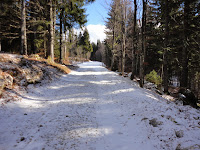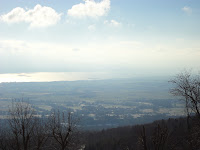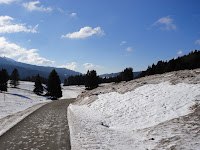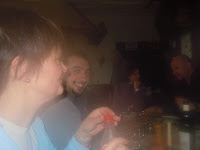For the past week and a half, I have been getting more involved in both my school work and my work for the Geneva International Centre for Humanitarian Demining, so I have not had as much time to explore as I would like. This Saturday a group of 10 of us will be taking an early morning train to Lausanne to further explore that town, and go out at night there for a few hours until our return trip at 1:30am. We got the tickets for 21 Swiss Francs (about $21) round trip, which is half the normal price so we are all very excited about that trip. There was a consensus amongst some people that getting out of Geneva was a must for this weekend, and in fact, most of our group will be gone all weekend. The extended exploration of Europe is beginning!
This semester in school, I am taking 9 credit-hours of classes, and receiving another 3 credit-hours for my internship. The classes I am taking are European Politics, Problems with International Organizations, and International Trade. Those first two classes are taught by Dr. Suzanne Peters, who is a German-national, married to a Spanish man (because, according to her, German men are awful), living in Geneva. Before Switzerland, she and her family lived in France for several years. Her father fought in the German Wehrmacht in World War II on the Eastern front against the Russians, and after the war when she was just two years old, her family illegally immigrated from East to West Berlin before the construction of the Berlin Wall. She told the story of how her family all rode on the same train but she was sitting with her mother, and her father and two siblings were sitting farther back in the train in another car to eliminate suspicion of the Secret Service employees that monitored the travel documents of the passengers. When the woman came to check her mother's travel documents, young Suzanne, being excited and overly talkative, remarked "and my Father and two brothers [or sisters, I can't remember] are further back on the train!" While her Mother's heart-beat skyrocketed, the Woman checking their documents ignored the annoying child. Her experience growing up in post-War Germany has given her interesting perspective on European politics. So far we have had three classes, and all we have covered is German pre-War history and WWII history. The reason for this is because she believes that
everything that happens in European politics is directly related to World War II, its origins, and aftermath. I thoroughly enjoy my other classes too, and I'll give updates on those periodically throughout the semester also.
Work has been great so far. Let me explain my NGO as briefly as I can:
In the mid-1990s, several States came together to sign the Ottawa Convention (or the Anti-Personnel Mine Ban Convention, APMBC), which was an international agreement to combat landmines. All States that signed agreed to destroy their current stockpiles, not transfer anymore mines, not build anymore mines, remove any mines that have been emplaced on their territories, and assist any other States that have signed on that do not have the means to complete these tasks. There are time lines for these tasks, and to help States complete them, the Convention called for the formation of the Geneva International Centre for Humanitarian Demining (GICHD). This Non-Governmental Organization (NGO) has several departments, including Operations, Communicationsmy department, the Implementation Support Unit (ISU). The ISU's jobs include keeping up the Documentation Centre for the GICHD, organizing the yearly Meeting of States' Parties and other conferences, and getting countries the help that they need in order to fulfill their requirements to the Convention. Not so brief an explanation, I know. But my official job title is Intern for the APMBC ISU. So far, they have set me free on the Documentation Centre, organizing documents into logical categories and cataloging it all into a bibliography.
On Friday, the GICHD took us for a team-building day in a remote area outside of Lausanne called La Givrine. We arrived at about 10:30am and immediately started a 5 kilometer hike on the coldest/most windy day that this area has seen all winter (around 25 degrees Fahrenheit). By the time we arrived at our destination, we were chilled to the bone. Our destination was a building that is owned by the State, but is rented out all year long. For the 6 warmer months, it serves as a farm-house, and in the colder months it is rented out to a family who operate a restaurant for the cross-country skiers, hikers, and snow-shoers who frequent the beautiful forests in the area. The dining area was no bigger than 20' x 20' with an open fire pit on one side that provided the warmth for the room and heated the water for the whole facility. We were greeted at our tables with bottles of local wine to warm us, fresh slices of bread, and plates of thinly sliced, dried and salted beef which was one of the tastiest applications of beef I have ever eaten. We talked as we made our way through the appetizers and a few glasses of wine, and finally our fondue arrived. It was in a beautiful pot and consisted of local wine and cheese. I knew the Swiss take fondue seriously, but I had no idea of the extent. There is a whole ettiquette behind it. You're not supposed to just dip, you're supposed to submerge and stir, in order to keep it from separating. There is a very strong liquor called Kirsch which you order in a shot glass and slightly dip your bread in before even putting it into the cheese. Finally, when you're down to the last centimeter or so in the pot, you let it cook and almost burn to the bottom, at which point the server will scrape it for you and you snack on the crispy cheese. It was a true cultural experience. There were no health inspection certificates and our servers were the two sons and the wife of the gentleman who was cooking for us and they were wearing their street clothes. The chef wore a flannel shirt and came out to chat with us on several occasions during the meal. It was informal home cooking and I loved it. Finally, when we were filled with bread and cheese and buzzed from the wine and Kirsch, we took our hike back down the path and headed back to Geneva.
I'm excited to get out to Lausanne again this weekend, and I'm sure I will have more to report on then!
 |
| La Givrine |
 |
| Overlook of Lake Geneva |
|
 |
| La Givrine Hike |
 |
| Open pit fire, water-heater on the right |
 |
| Huge Cowbells |
 |
| Farmhouse/Restaurant |
 |
| La Givrine |
 |
| Part of the group |
 |
| Camera lens fogging from change in temp. |
 |
| Walk down |
 |
| Walk down |



































































